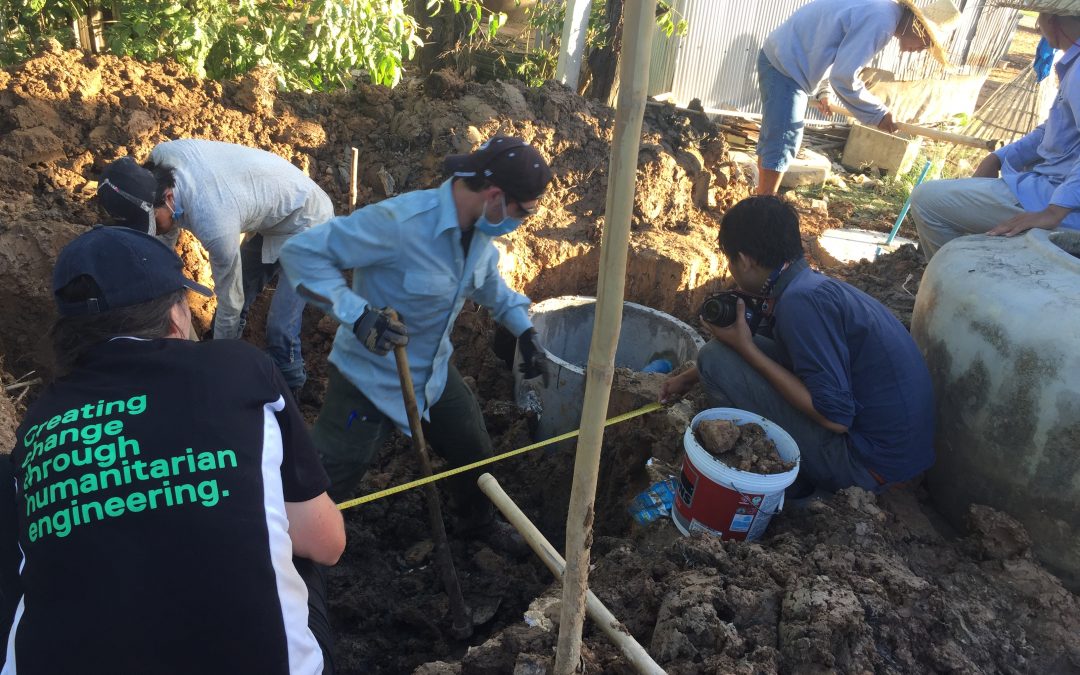World Toilet Day is 19 November. It’s a time to consider the massive impact safer sanitation and hygiene solutions can have for the 4.2 billion people living without access to safe sanitation. The day focuses on international efforts to achieve SDG 6: Water and sanitation for all by 2030.
Preventable diarrhoeal disease remains the second biggest killer of children under the age of 5 worldwide.
Many communities live where conventional, affordable and easy-to-construct pit latrines are not a viable solution. EWB’s SCE program, or Sanitation in Challenging Environments, seeks to provide solutions for communities in these environments. A recent piece of research has provided invaluable insights into a particularly challenging environment: Sanitation in hard rock environments.
Hard Rock Challenges
Communities living in hard rock, or hard clay and soil areas, face particular and unique challenges.
This type of terrain prevents the use of a conventional pit latrine because it is extremely difficult to dig in. This challenge is compounded by the fact that fractures in rock and hard soil allow the faster flow of liquids. It means effluent does not slowly leach into the soil, instead, it can travel many metres in a minute, risking the contamination of local water sources.
Without practical hard rock technologies, Cambodian communities are exposed to diarrhoeal diseases. These diseases, even when not deadly, can cause chronic lifelong developmental challenges. And this in turn can play a role in causing isolation and limiting access to education for children.
The EWB / E4C Report
The Sanitation In Challenging Environments In Cambodia: Appropriate Sanitation Solutions Hard Rock Areas in Rural Cambodia project, co-delivered by EWB Australia and Engineering For Change (E4C), carried out much-needed research in this space.
E4C has a great track record advocating for the role of engineering in sustainable development. Working alongside them has been a great opportunity to enhance EWB’s work. They bring together researchers from around the world to power a Knowledge Sharing Hub with global reach, and provide a critical platform for the dissemination of appropriate technologies and knowledge.
The research, led by E4C fellows Jonathan Truslove (a Scotland-based engineering researcher) and Thomas Da Jose, a University of Technology Sydney engineering alumni and current Project Manager at Aecom, Sydney. The work identified a series of different technologies that may be appropriate for hard rock environments and the factors that will allow them to scale. As such, it provides a critical foundation on which EWB can trial and develop technologies that will enable access to sanitation in many hard rock and ground areas.
The recently published full report can be viewed here.
World Toilet Day: Effecting Critical Change
World Toilet Day is a day to acknowledge this simple fact: Successful solutions for hard-rock sanitation would mean a reduction in mortality rates in vulnerable communities, a reduction in medical costs for families and an increase in the health of children, physically and socially.
Being able to co-publish research through E4C’s platform is just one of the benefits of this new relationship.
In the long term, working with E4C presents exciting opportunities to champion the consideration of SDGs within the global agenda.
We look forward to collaborating with E4C on more impactful research projects in the coming year, to broadening the range of work we do together, and to supporting the engineering sector as it assumes a necessary leadership role in sustainable development.
This World Toilet Day you can support EWB’s work with communities dealing with SCE here
Learn more about EWB’s Influencer Fellowship program and opportunities to participate in the global Engineering for Change Fellowship.
EWB’s international program is supported by the Australian NGO Cooperation Program (ANCP) and generous donors.
Featured image: EWB and International Development Enterprises (iDE) technical team working with Australian Field Professional Volunteers – work recognised as vital this World Toilet Day. Source: All Seasons Upgrade (ASU) Project.


